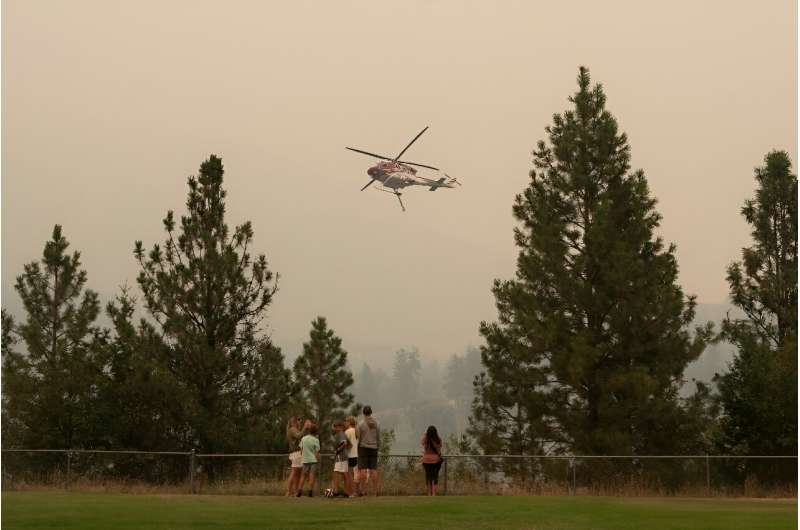This article has been reviewed according to Science X's editorial process and policies. Editors have highlighted the following attributes while ensuring the content's credibility:
fact-checked
reputable news agency
proofread
Canada wildfires spread and merge as evacuations continue

Two fast-moving "extreme" wildfires merged overnight in western Canada, threatening hundreds more homes and forcing continued evacuations in a wide swath of British Columbia province, officials said Sunday.
The growing blaze is now centered near the town of Shuswap, 500 kilometers (310 miles) northeast of Vancouver, and it covers more than 41,000 hectares (100,000 acres), fire officials in British Columbia said.
Strong northern winds continued to fan the flames, as hundreds of firefighters struggled to control them.
Across the province, some 30,000 people have been ordered to evacuate while 36,000 others have been told to be prepared to leave in short order.
Canada's Northwest Territories, north of British Columbia, are also facing a grave fire threat. The territorial capital Yellowknife has been surrounded by wildfires for days. Nearly all the city's 20,000 people have left.
After overnight rains brought fire crews a brief respite, the fire threat was growing again on Sunday, the authorities said.
Many of the thousands of evacuees were converging on the city of Kelowna, which lay under a dense layer of smoke visible from 100 kilometers away.
A 39-year-old hotel worker named April, who declined to give her last name, said she had had to evacuate with two small children.
"I was crying, crying, crying," she told AFP. "It was really sad to leave our things, our house—I don't know what will happen."
One official warned that some evacuations might not be short-lived, lasting "weeks and not days." That message, from Mayor Kandis Jameson of Hay River, a small town near Yellowknife, added that the situation would be reviewed weekly.
Fires have destroyed hundreds of structures in a region popular with tourists.
"It has been horrible to spend the week with this air, it is horrible to breathe," 29-year-old Mary Hicks, who was in Kelowna visiting a friend, told AFP. "When we had to evacuate it was so scary."
She was to have flown to Montreal but civilian flights from Kelowna were canceled to make way for fire-fighting aircraft.
Bowinn Ma, the British Columbia minister of emergency management, emphasized the seriousness of evacuation orders.
"It is a matter of life and death," she said, not only for the residents affected but for emergency personnel who have to go into danger zones to persuade reluctant residents to leave.
"Do not travel to fire-affected areas of the province for tourism or fun," she tweeted Sunday on X. "Do not go to the Okanagan. Do not go to Shuswap."
Canadian Prime Minister Justin Trudeau said Sunday he had approved British Columbia's request for federal assistance.
"We're deploying @CanadianForces assets and providing resources to help with evacuations, staging and other logistical tasks," he said on X.
Canada is experiencing a record-setting wildfire season, with official estimates of more than 14 million hectares already burned—roughly the size of Greece. Four people have died so far.
Scientists say human-caused global warming is making natural hazards both more frequent and more deadly.
© 2023 AFP




















